World map of names shows lots of Smiths in Australia
A fascinating new map has plotted out the most common surnames in every country in the world. Can you guess the most common last name in Australia?
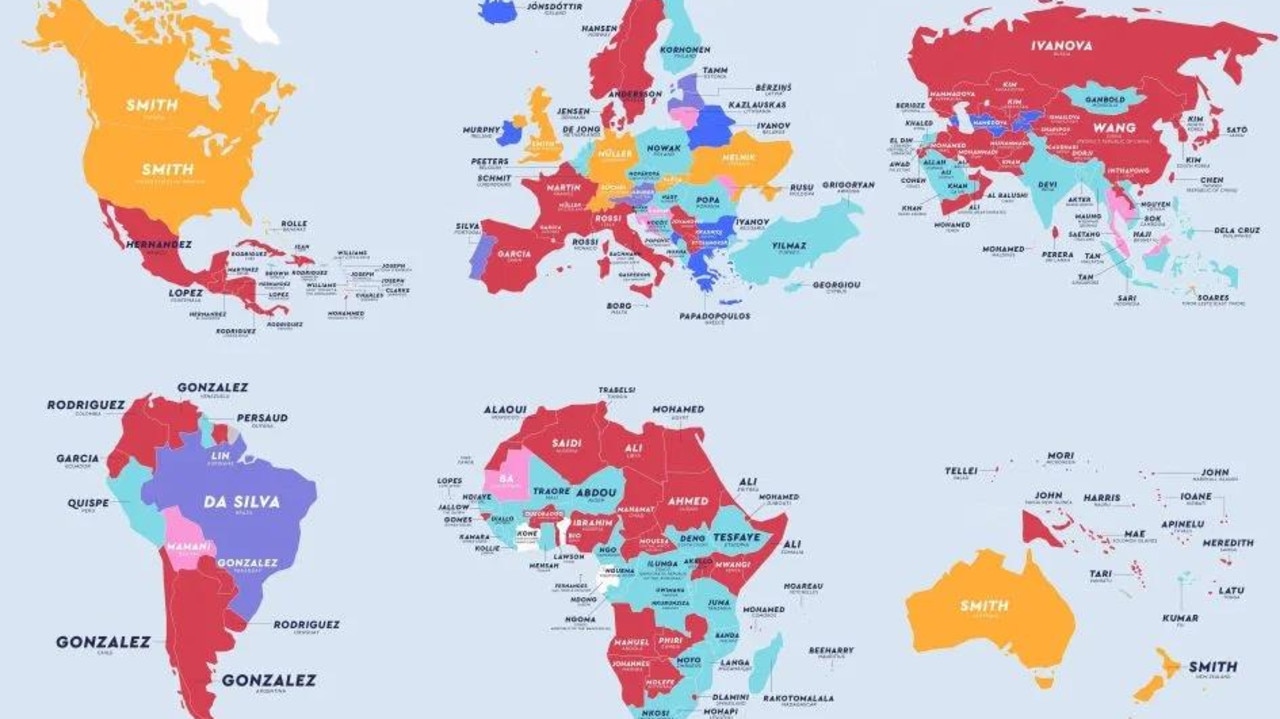
READING LEVEL: GREEN
A fascinating new map has plotted out the most common surnames in every country in the world.
The map also highlights the origins of different names, providing insights into the histories and cultures of different societies.
The most common name in Australia is Smith, and the same is true in the US, Canada, UK and New Zealand.
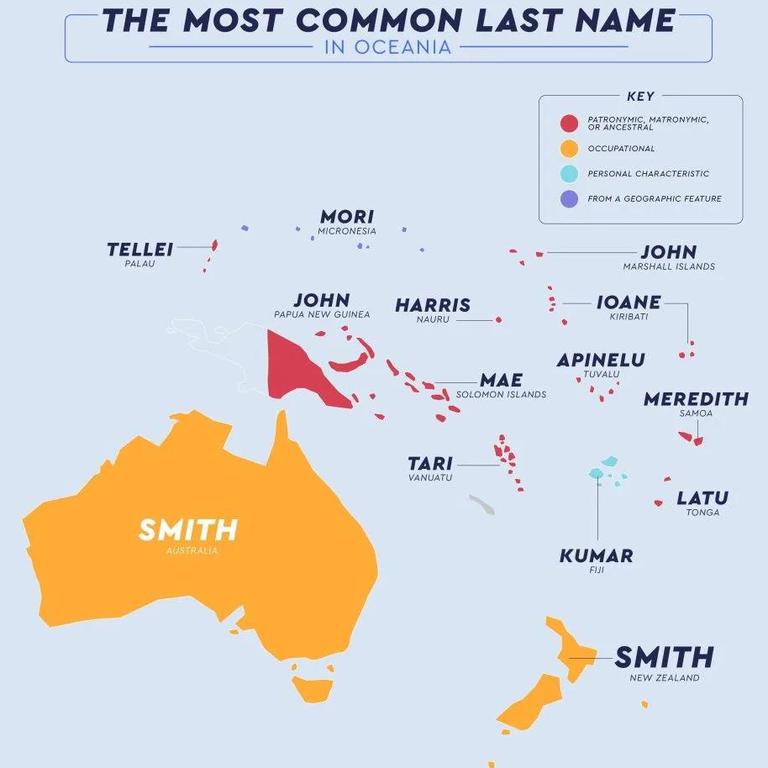
Smith is derived* from the Anglo-Saxon word smitan, which means “to strike”, and became the name for a man who worked with metal.
The fact that blacksmiths existed in most countries means versions of the name Smith are common around the world, but particularly in English-speaking former territories of the British Empire.
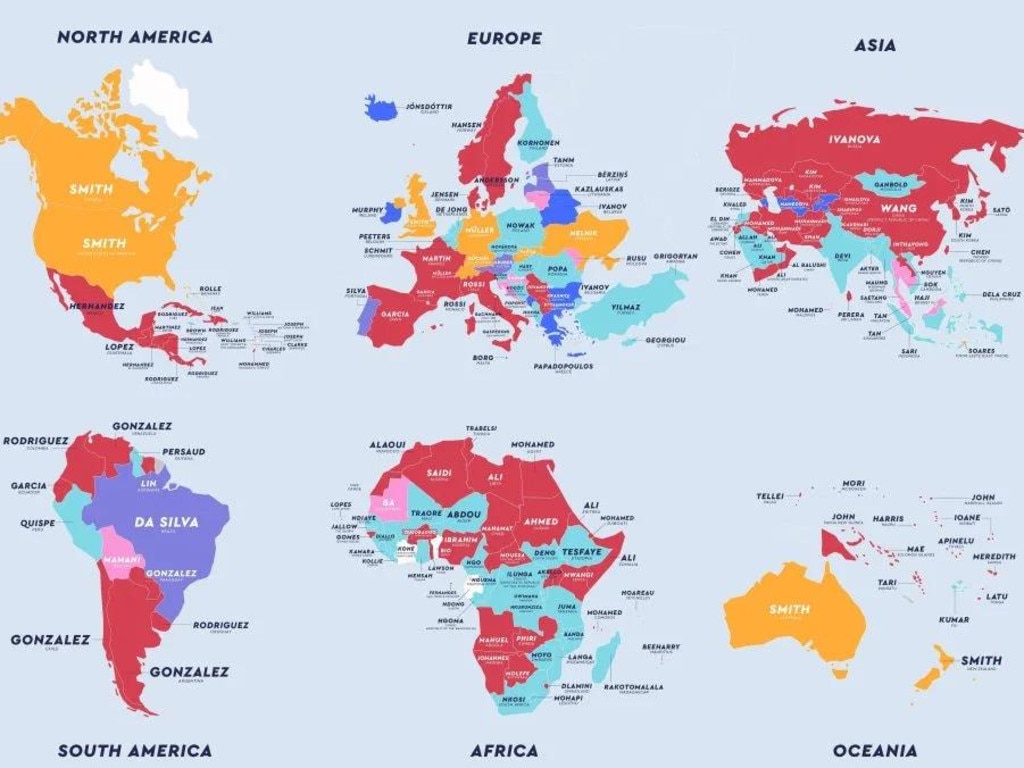
In Ireland, the most common surname is Murphy, while in France it’s Martin, and in Spain it’s Garcia.
In Sweden it’s Andersson, in Italy it’s Rossi, and in Poland it’s Nowak.
The most common name in China is Wang, while in India it’s Devi and in Mongolia it’s Ganbold.
Gonzalez tops the list in four South American countries – Chile, Argentina, Venezuela, and Paraguay – while Rodriguez does it in Uruguay and Colombia.
The origins of the name Gonzalez can be traced back to the medieval Germanic* name for war.
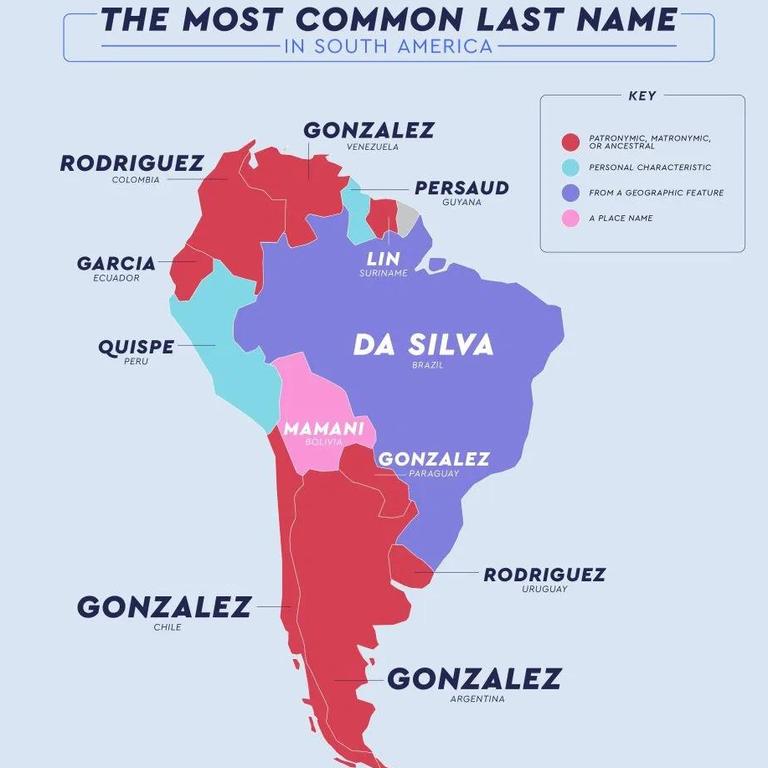
The most common surnames are far more varied across Africa.
In Egypt it’s Mohamed, in the Congo it’s Ilunga, and in South Africa its Nkosi, while in Sierra Leone it’s Kamara, Ethiopia it’s Tesfaye, and in Angola it’s Manuel
The map was created by online lending company NetCredit.
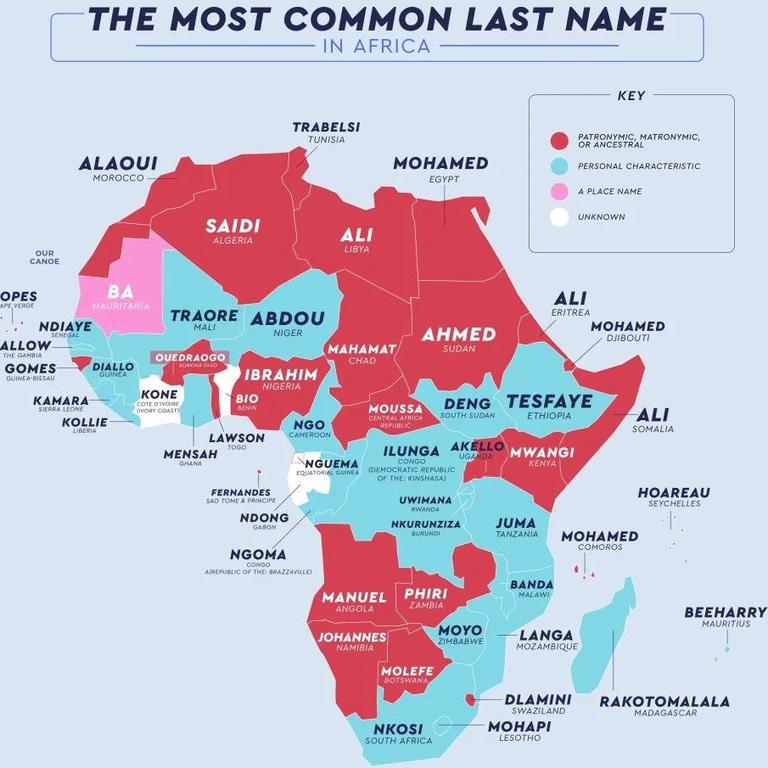
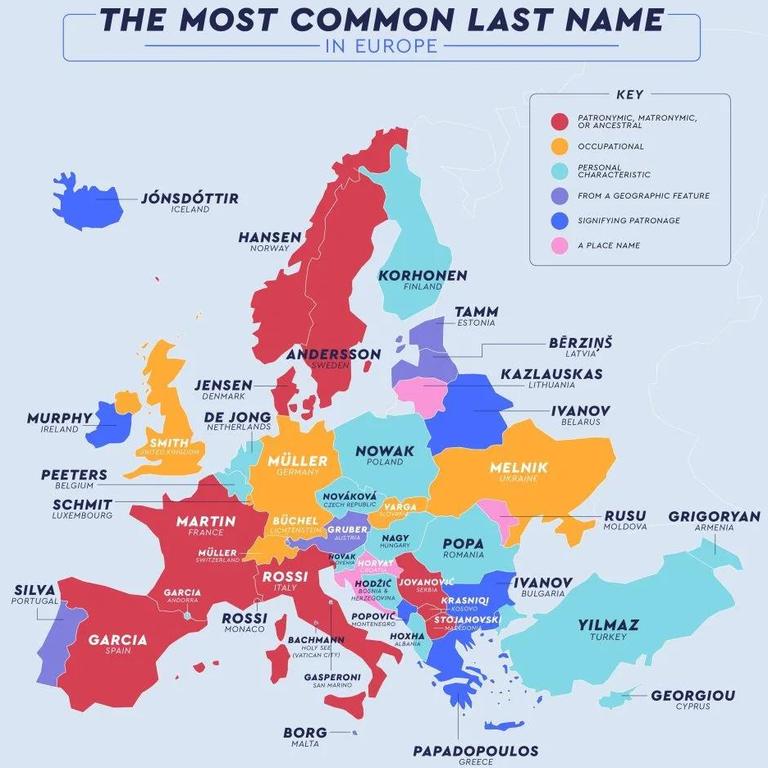
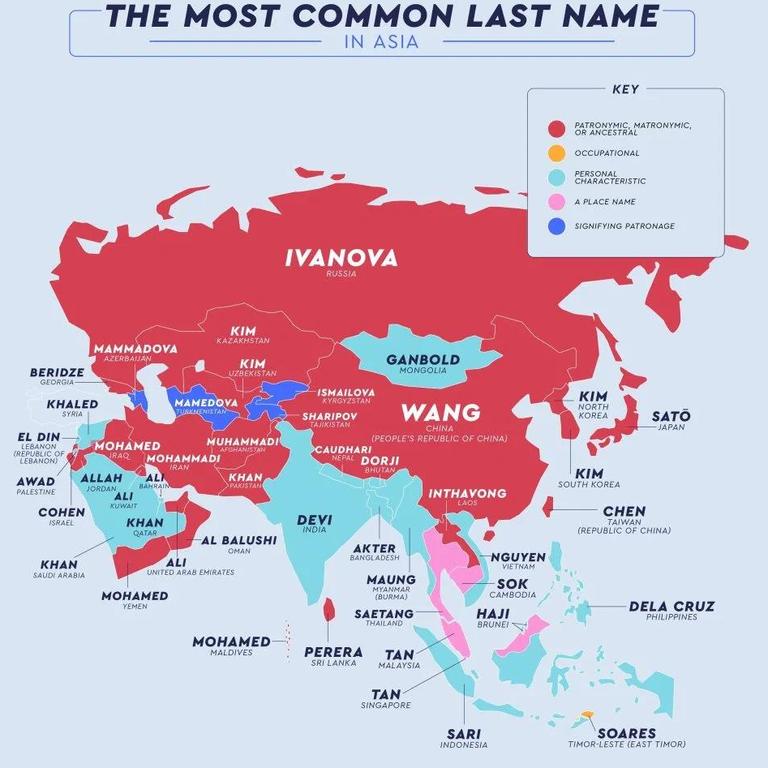
HOW NAMES BEGIN
The map also plots out the origins of the names.
Patronymic names are derived from a father’s first name, like Johnson or Jones, which both mean “John’s son”.
Some names honoured a patron*, like Kilpatrick, which means “follower of Patrick”.
The Slavic ‘-ov’ means ‘the son of’ and is similar to the suffix ‘-en’ on the end of ‘Jensen’ or ‘Hansen’ in Scandinavia.
Some people were named for a place or geographical features.
Others describe a person’s characteristics. For instance, ‘Bērziņš’, the most used Latvian family name, originates from the word for ‘birch’, which would signify someone who lived among birch trees.
In Austria Gruber is the most common surname and evolved from the Middle High German* word for ‘pit’.
Many people were named after their occupation, hence the names Smith, Miller, and Taylor.
In the world overall, China and India’s most popular names took first and second place.
This article was originally published in the The Sun and is republished here with permission.
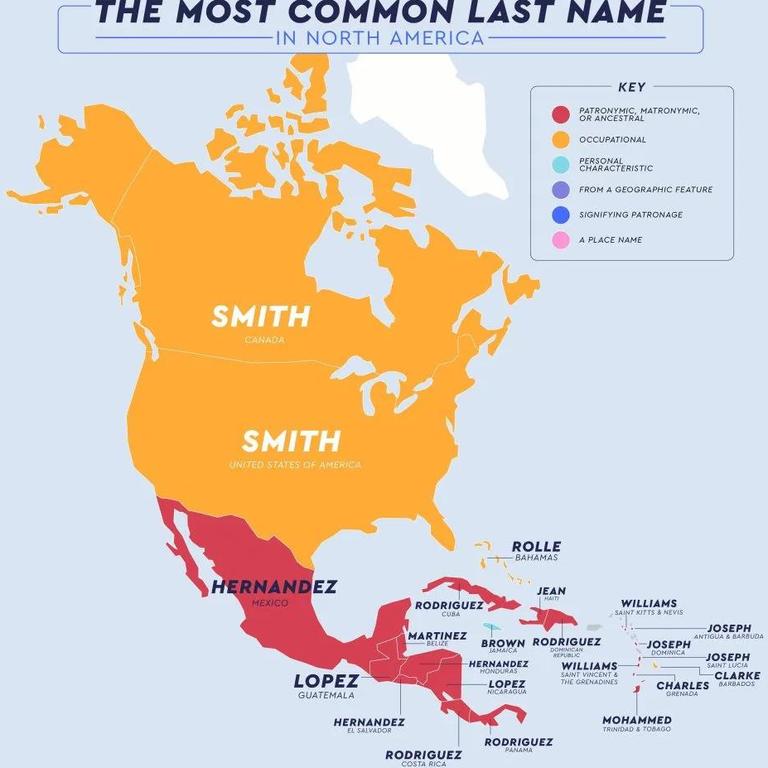
GLOSSARY
- derived: originally came from
- Germanic: a racial group that originated from northern Europe
- patron: advocate or person who looks out for others; religious saints are often called patron saints, meaning they look out for a particular group of people, such as children
- Middle High German: the form of the German language spoken in the High Middle Ages
EXTRA READING
A big multicultural melting pot
Hobart could be known as Nipaluna
How mythology still influences modern life
QUICK QUIZ
- Name one country where Smith is the most common name. What did it mean?
- Where is Ilunga a common name? What continent is this country a part of?
- What does patronymic mean?
- What does ‘-ov’ mean in Slavic countries?
- Where is Gruber a common name?
LISTEN TO THIS STORY
CLASSROOM ACTIVITIES
1. Create a Pie Chart
Look carefully at the maps in today’s story. Each map has the different categories of where the names came from. For each map, write the number of names in each category. Then, create a pie chart or graph, using the numbers. What do your graphs tell you about the history of names?
Time: allow 45 minutes to complete this activity
Curriculum Links: English, Mathematics, History
2. Extension
It was a perfectly normal day. Except for one thing. Everyone had forgotten their name. In fact, all names had completely disappeared.
Write the story of what happens next.
Time: allow 30 minutes to complete this activity
Curriculum Links: English, Critical and Creative Thinking
VCOP ACTIVITY
Proper Noun Police
A proper noun is a noun that names a particular person, place or thing. Is always has a capital letter.
How many proper nouns can you find within this article? Find them all and sort them into the category of name, place, time (date/month).
Can you find any proper nouns included in your writing?
What are they?
Can you sort them into their categories?
HAVE YOUR SAY: Is your name common where you live? Would you prefer a common or uncommon name?
No one-word answers. Use full sentences to explain your thinking. No comments will be published until approved by editors.

